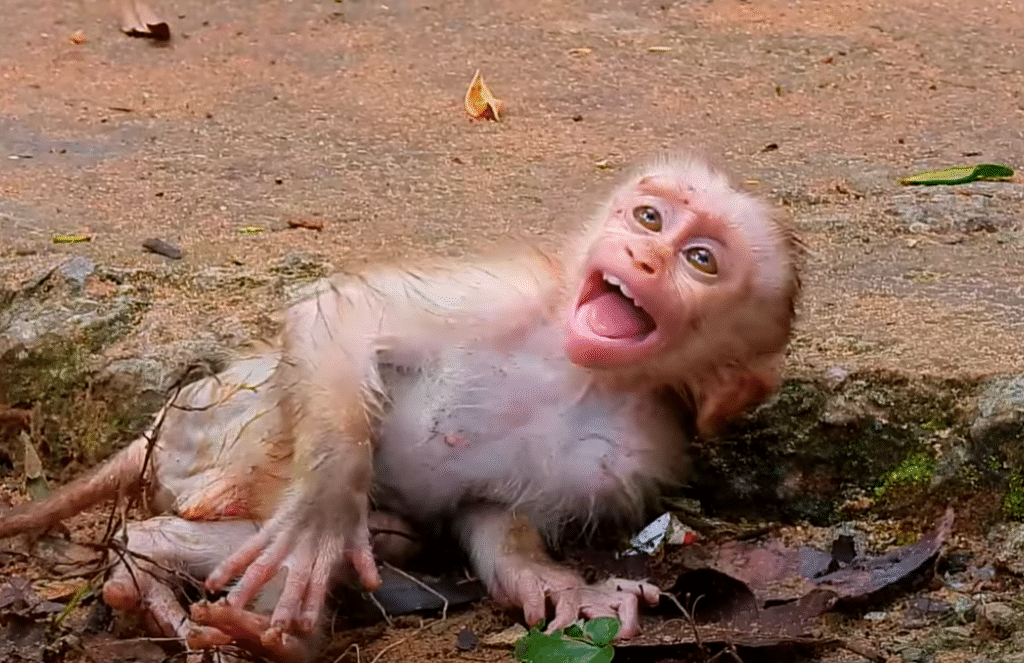In the sacred silence of Angkor Wat’s forest, as golden sunlight filtered through ancient trees, a tiny miracle clung tightly to his mother’s chest.
His name was Rumi.



Born beneath the heavy shadows of moss-covered stone, Rumi entered the world as the jungle breathed in perfect stillness. His mother, Alani, was already respected in the troop—a calm, intelligent female who chose a nesting site tucked safely beneath an old bodhi tree. It was there, with the echoes of temple drums still whispering through the trees, that baby Rumi drew his first breath.
From the moment he arrived, the forest seemed to bend around him like a cradle. Birds paused their songs. Even the troop’s alpha male, usually aloof, stood a respectful distance away. They all knew this was something special.
Alani cradled her son closely. He was impossibly small—just the size of her forearm, with deep brown eyes that already scanned the world with silent wonder. His hands, though tiny, gripped her fur with strength. She nuzzled his head and made a low, loving hum. Rumi responded with a soft squeak, barely audible, but more than enough to melt the hearts of every nearby female.
Unlike many babies born into the wild chaos of the jungle, Rumi’s life began in peace.
In the days that followed, Rumi thrived. He learned to nurse without struggle, always full and warm. Alani was patient, never moving too fast, always checking his face, his breathing, his grip. Whenever the troop moved, she wrapped her tail around his tiny leg to steady him. Rumi, in return, never let go. His world existed in her scent, her heartbeat, her warmth.
Visitors to Angkor Wat began to notice them—the way Alani moved like a whisper, with Rumi swaying from her chest like a living pendant. Children pointed. Adults slowed their steps. Some took photos. Some cried softly. There was something ancient and holy about it—about a primate mother protecting her child in the same place where kings once prayed and warriors once wept.
“He’s the luckiest baby here,” one monk whispered as he watched from a distance.
He wasn’t wrong.
Rumi’s perfect life unfolded like a song. As he grew, he began to explore. At first, cautiously—his little feet stepping onto vines and roots while Alani watched with fierce, motherly eyes. Then, with more confidence. He learned to leap, to swing, to chase light beams as they flickered through leaves.
But no matter how far he wandered, he never strayed long. Every adventure ended with him curled up under his mother’s arm, the drumbeat of her heart lulling him to sleep.
At six weeks old, Rumi found his voice.
It happened when a butterfly brushed his nose. He squealed—not in fear, but in laughter. The whole troop turned to look. A juvenile cousin jumped beside him and joined in. Soon, Rumi’s giggles echoed beneath the canopy, drawing even the elders from their shady seats to witness this sound of pure joy.
One afternoon, something remarkable happened. As the troop basked in the warmth of a sun-drenched clearing, Rumi climbed onto a flat stone that once belonged to a broken temple statue. He stood tall—his fur glowing, his eyes bright—and he raised his arms in a mimic of the monks he’d seen.
The whole troop froze.
For just a moment, it looked as though this tiny baby was blessing the jungle.
Then Alani scooped him up, nuzzled his cheek, and the troop burst into soft grunts of amusement.
From that day forward, they called him “Little Spirit.”
Not every primate has a life like Rumi’s. The forest can be cruel. Hunger, injury, even separation from mothers is common. But somehow, Rumi had avoided it all.
He had food.
He had laughter.
He had love—endless, unwavering, unconditional love.
His mother never left his side. Even at night, when the cicadas shrieked and owls watched from above, Alani slept curled around her son, one hand on his back.
Rumi never knew fear.
He only knew warmth.
And in a world where life can be fleeting, that alone was a miracle.
Today, Rumi still plays near the ancient ruins. He climbs vines that dangle from sacred walls. He giggles at the tourists, mimicking their voices. And sometimes, if you’re lucky, you’ll find him curled in Alani’s lap, sleeping like the forest itself is singing him a lullaby.
To see Rumi is to remember what’s possible:
That even in a wild world, a perfect life can bloom.